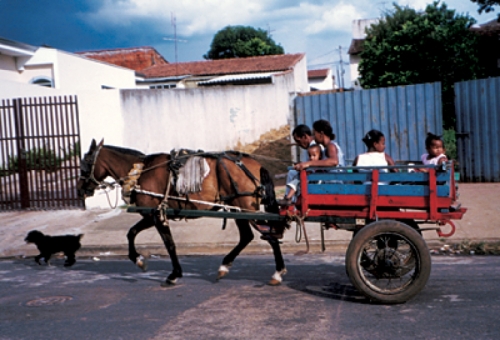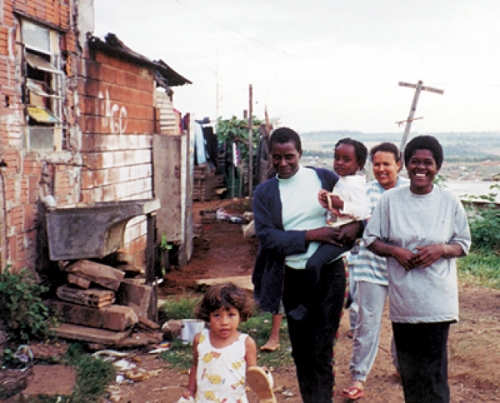An undergraduate thesis can be a daunting undertaking, especially when you’re trying to write one that involves a couple of trips to Brazil and care for two young children. But with some help from her mother, Katy O’Leary took her son Nicholas and daughter Janice with her to São Carlos, São Paulo, to interview domestic servants in Brazil. Her kids played with the children of the domestic servants while O’Leary interviewed the women.
O’Leary says her seven-year-old son was probably too young to understand what was going on, but her daughter’s curiosity about her Brazilian playmates motivated O’Leary to pursue her research. She says of her daughter, who is 12 years old, “It was an astonishing observation from her that even though they were poor they were very much like her. That had a big impact on her. She was fascinated by how these people lived.”
O’Leary took an interest in domestic servants just after high school when she visited Daniela, a Brazilian exchange student who had lived with her family in the United States. Daniela’s family had a domestic servant. “I was amazed that there was this woman in the house that cleaned up after me at every turn. I was very curious about what that was all about,” O’Leary says.
She always knew that she wanted to go back to Brazil, but it wasn’t until she’d worked in real estate for several years, gone back to college, and faced an undergraduate thesis that she remembered domestic servants. At 31, she went back to find out what was going on. “I was intrigued by these women who basically cared for everybody in the middle class and above in Brazil,” she says. “They do everything — washing, cooking, cleaning, caring for the kids. They run the household really.”
Not many people had done the kind of research that O’Leary wanted to do. “There’s been a lot of research done on the relationships between the patroa (patron or boss) and the maid,” she says. “Researchers talk about how oppressed domestic servants are, how everybody thinks they are going to steal, how they’re hungry and poor, and how the patroa is very oppressive and keeps them in that situation. It’s pretty easy to see that dynamic.”
O’Leary wanted to do something different, something that focused more on the women and less on the boss. “I wanted to focus on what they think, what they want, what their views are,” O’Leary says.
Néia, the domestic servant at Daniela’s school, introduced O’Leary to many women in and around the city of São Carlos. O’Leary taped interviews with 22 women — white, black, and mulatta — from a variety of backgrounds. There were women who had worked in domestic service from the time they were 12 years old, women who had left domestic service jobs because of illness or better job opportunities, women who worked as head domestic servants managing a team of other servants. She found that all are very poor but live with a sense of dignity that surprised her. “I had this stereotypical idea that poverty meant filth,” O’Leary says. “From the road, it looks very filthy. There’s garbage on the ground. But then you walk into a house — and I went into many unannounced — it was such a contrast from being outside in the street to being inside these very poor but immaculately clean homes.”
In her research, O’Leary discovered that there are more women in domestic service in Brazil than in any other occupation, and most make the equivalent of $150 a month. For O’Leary, the question became, how do they make ends meet?
When she sat down with domestic servants to discuss their budgets, they always reported spending more than they brought into the household. How was that possible? Certainly the government wasn’t making up the difference.
“Local officials would go in and bribe the poor for votes,” O’Leary says. “The feedback from the community was, ‘They only come around and tell us they are going to help us when they want our votes.’” She says that candidates come into poor neighborhoods and promise such things as electrical lines, new sewer systems, and running water.
“If they do some of those things,” she says, “it’s only a very small portion of what they originally promised. And then as time goes on and they are in office, those problems are forgotten. It’s a vicious cycle, and it’s been going on like this for years.”
O’Leary found that while they often cannot rely on government institutions for assistance, people establish their own networks. If they don’t have the money for things they need to do, they will find a way to make it happen. She says that the two most-used resources for women are family and the Catholic Church.
Néia’s story provides an example. Néia is a domestic servant, and her husband is a road construction worker. Their combined income is about 700 Reis ($350) a month. They have three children, a son-in-law, two grandchildren, and a cousin and her husband living with them. Only Néia and her husband work on a regular basis. They are able to pay the bills and provide enough food for everyone living under their roof by relying on other family members who live close by. “They live so close to each other,” O’Leary says, “that they can yell across the street at each other, ‘Lucia needs 10 Reis to make up the rest of her electric bill,’ and they come over and give her the money.”
When Néia’s son needed eye surgery, she got together with her family and several people from the Catholic Church to throw a barbeque. They charged 10 Reis ($5) a piece, which O’Leary says is a lot of money for them, and were able to raise enough money for the surgery. “I find that they are very innovative, that they have this amazing strength to be able to get beyond the fact that they are poor, oppressed, and illiterate. And they just sort of figure it out. They find a way to do it,” she says.
O’Leary wants other people to have the opportunity to see and understand the poverty among domestic servants and their families in Brazil. “I think that Americans are very unaware of what’s going on in the rest of the world,” she says. “Latin America is in our backyard. I don’t think I’ll take for granted ever again that I’m an American living in this country. I feel extremely fortunate to have been born here and to be afforded the opportunities that I’ve been afforded.”
What’s next? Graduate school in anthropology or history, she says. And her focus — domestic servants in Brazil. “It’s really important to listen to these people,” she says. “Their voices get lost in the shuffle. So that’s my mission. I want to give them a voice and let them tell their story.”
O’Leary says that being an undergraduate and a mother is the hardest thing she’s done in her life. But, she says, “Had I gone to school when I was younger, I would not have accomplished all this. I would not have understood what education has to offer.”
Mary Alice Scott was formerly a staff writer for Endeavors.
O’Leary’s research was funded through a Smallwood Undergraduate Research Grant. She majors in Latin American studies and will graduate in December 2002.






